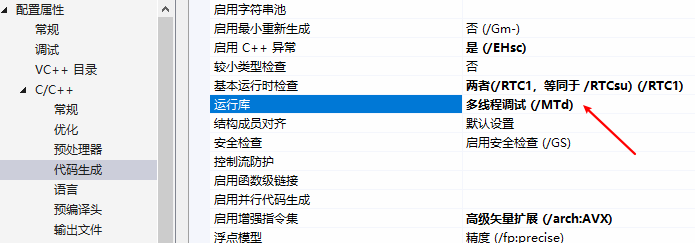win10 + VS2017 + MNN 编译使用
1. VS2017 安装
1. 从这里下载在线安装器,随后在 cmd 窗口中离线下载安装包:
vs_Professional.exe --layout D:\vs2017-offline --lang zh-CN
下载完后,双击 vs_setup.exe 安装,选择
2. 安装 插件(可选)
插件(可选)
2. 配置高版本 cmake 到环境变量
去这里下载好了 ,然后将可执行程序所在文件夹添加到环境变量
D:\cmake-3.20.2-windows-x86_64\bin
3. MNN 推理框架编译
去官网下载 MNN 源码到本地
3.1 编译 flatbuffers
右键管理员运行 “VS 2017 的开发人员命令提示符”
"C:\Program Files (x86)\Microsoft Visual Studio\2017\Professional\VC\Auxiliary\Build\vcvars64.bat" cd D:\MNN\3rd_party\flatbuffers mkdir tmp && cd tmp cmake -G "Ninja" -DCMAKE_BUILD_TYPE=Release .. ninja
3.2 编译 推理框架
右键管理员运行 “VS 2017 的开发人员命令提示符”, 这里需要借助 powershell
"C:\Program Files (x86)\Microsoft Visual Studio\2017\Professional\VC\Auxiliary\Build\vcvars64.bat" cd D:\MNN powershell set-executionpolicy -executionpolicy unrestricted powershell ./schema/generate.ps1 powershell .\package_scripts\win\build_lib.ps1 -path MNN-CPU/lib/x64
完成后在 D:\MNN\MNN-CPU 这地方会有各种版本的推理库
4. MNN Demo& Convert 编译
4.1 编译 protobuf
参考官方教程
这里我选择使用 VS 编译 Debug 和 Release 版本
右键管理员运行 “VS 2017 的开发人员命令提示符”:
"C:\Program Files (x86)\Microsoft Visual Studio\2017\Professional\VC\Auxiliary\Build\vcvars64.bat" cd cmake mkdir build & cd build mkdir solution & cd solution cmake -G "Visual Studio 15 2017 Win64" -Dprotobuf_MSVC_STATIC_RUNTIME=ON -Dprotobuf_BUILD_TESTS=OFF -DCMAKE_INSTALL_PREFIX=../../../../install ../..
然后用 VS2017 分别编译出 Debug 和 Release 版本,双击 extract_includes.bat 复制头文件
最后将 include 和 Release(Debug)生成文件夹加入环境变量
4.2 单独编译 demo
右键管理员运行 “VS 2017 的开发人员命令提示符”:
"C:\Program Files (x86)\Microsoft Visual Studio\2017\Professional\VC\Auxiliary\Build\vcvars64.bat" cd D:\MNN mkdir build_demo cd build_demo cmake -G "NMake Makefiles" -DCMAKE_BUILD_TYPE=Release -DMNN_BUILD_DEMO=ON .. nmake
4.3 单独编译 convert
右键管理员运行 “VS 2017 的开发人员命令提示符”:
"C:\Program Files (x86)\Microsoft Visual Studio\2017\Professional\VC\Auxiliary\Build\vcvars64.bat" cd D:\MNN powershell set-executionpolicy -executionpolicy unrestricted powershell .\package_scripts\win\build_tools.ps1 -path MNN-CPU/lib/x64
4.4 换个姿势
这里其实可以修改 build_tools.ps1
mkdir build_convert # mkdir build pushd build_convert # pushd build
并添加
DMNN_BUILD_DEMO=ON
借助 powershell
"C:\Program Files (x86)\Microsoft Visual Studio\2017\Professional\VC\Auxiliary\Build\vcvars64.bat" cd D:\MNN powershell set-executionpolicy -executionpolicy unrestricted powershell .\package_scripts\win\build_tools.ps1 -path MNN-CPU/lib/x64
5. MNN Debug 编译
5.1 Debug
右键管理员运行 “VS 2017 的开发人员命令提示符”:
"C:\Program Files (x86)\Microsoft Visual Studio\2017\Professional\VC\Auxiliary\Build\vcvars64.bat" cd D:\MNN mkdir build_debug& cd build_debug cmake -G "Visual Studio 15 2017 Win64" -DMNN_BUILD_SHARED_LIBS=ON -DMNN_BUILD_CONVERTER=ON -DMNN_BUILD_DEMO=ON -DCMAKE_BUILD_TYPE=Debug ..
随后打开创建的 VS 工程编译即可
注意:这里的运行库方式要和 protobuf Debug 生成时保持一致

5.2 OpenCL
同上面一样,换个姿势再来一次
右键管理员运行 “VS 2017 的开发人员命令提示符”:
"C:\Program Files (x86)\Microsoft Visual Studio\2017\Professional\VC\Auxiliary\Build\vcvars64.bat" cd D:\MNN mkdir build_opencl & cd build_opencl cmake -G "Visual Studio 15 2017 Win64" -DMNN_OPENCL=ON DMNN_BUILD_DEMO=ON -DCMAKE_BUILD_TYPE=Debug ..
5.2 Vulkan
。。。, 换个姿势再来一次
右键管理员运行 “VS 2017 的开发人员命令提示符”:
"C:\Program Files (x86)\Microsoft Visual Studio\2017\Professional\VC\Auxiliary\Build\vcvars64.bat"
cd D:\MNN
mkdir build_vulkan & cd build_vulkan
cmake -G "Visual Studio 15 2017 Win64" -DMNN_VULKAN=ON -DMNN_BUILD_DEMO=ON -DCMAKE_BUILD_TYPE=Debug ..
5.4 测试代码
选择 caffe mobilenet 的分类网络
5.2.1 MNN 转换模型 MNNConvert
-f CAFFE --modelFile D:/MNN/demo/model/MobileNet/Caffe_MobileNet_V2/mobilenet_v2.caffemodel --prototxt D:/MNN/demo/model/MobileNet/Caffe_MobileNet_V2/mobilenet_v2_deploy.prototxt --MNNModel D:/MNN/demo/model/MobileNet/mobilenet_v2.mnn --bizCode biz
5.2.2 MNN 推理 pictureRecognition.out
D:/MNN/demo/model/MobileNet/mobilenet_v2.mnn D:/MNN/demo/model/MobileNet/testcat.jpg D:/MNN/demo/model/MobileNet/synset_words.txt
Can't Find type=4 backend, use 0 instead
Can't Find type=4 backend, use 0 instead
input: w:224 , h:224, bpp: 3
origin size: 480, 360
output size:1000
Egyptian cat: 0.196567
tiger cat: 0.125614
tabby, tabby cat: 0.097382
red fox, Vulpes vulpes: 0.092684
kit fox, Vulpes macrotis: 0.077640
hare: 0.058969
wood rabbit, cottontail, cottontail rabbit: 0.033735
grey fox, gray fox, Urocyon cinereoargenteus: 0.026056
Norwich terrier: 0.022280
Pomeranian: 0.016270
5.2.3 原始 python Caffe

import argparse import numpy as np import caffe def eval(opt): nh, nw = opt.img_size, opt.img_size img_mean = np.array(opt.img_mean, dtype=np.float32) # caffe.set_mode_cpu() caffe.set_device(0) caffe.set_mode_gpu() net = caffe.Net(opt.proto, opt.model, caffe.TEST) im = caffe.io.load_image(opt.image) h, w, _ = im.shape if h < w: off = int((w - h) / 2) im = im[:, off:off + h] else: off = (h - w) / 2 im = im[off:off + h, :] im = caffe.io.resize_image(im, [nh, nw]) transformer = caffe.io.Transformer({'data': net.blobs['data'].data.shape}) transformer.set_transpose('data', (2, 0, 1)) # row to col transformer.set_channel_swap('data', (2, 1, 0)) # RGB to BGR transformer.set_raw_scale('data', 255) # [0,1] to [0,255] transformer.set_mean('data', img_mean) transformer.set_input_scale('data', opt.img_scale) net.blobs['data'].reshape(1, 3, nh, nw) net.blobs['data'].data[...] = transformer.preprocess('data', im) # np.save('data', net.blobs['data'].data[0]) out = net.forward() prob = out['prob'] prob = np.squeeze(prob) idx = np.argsort(-prob) label_names = np.loadtxt('synset.txt', str, delimiter='\t') for i in range(5): label = idx[i] print('%.2f - %s' % (prob[label], label_names[label])) return if __name__ == '__main__': parser = argparse.ArgumentParser(description='evaluate pretrained mobilenet models') parser.add_argument('--proto', dest='proto', default='MobileNet V2/mobilenet_v2_deploy.prototxt', help="path to deploy prototxt.", type=str) parser.add_argument('--model', dest='model', default='MobileNet V2/mobilenet_v2.caffemodel', help='path to pretrained weights', type=str) parser.add_argument('--image', dest='image', default='testcat.jpg', help='path to color image', type=str) parser.add_argument('--img-size', type=int, default=224, help='inference size (pixels)') parser.add_argument('--img-mean', type=list, default=[103.94,116.78,123.68], help='image mean [103.94,116.78,123.68]') parser.add_argument('--img-scale', type=float, default=0.017, help='scale image 0.017/1') opt = parser.parse_args() eval(opt)
0.25 - 'tiger cat'
0.17 - ‘Egyptian cat'
0.13 - 'tabby, tabby cat'
0.06 - 'red fox, Vulpes vulpes'
0.03 - 'hare'
5.2.4 调用 python MNN
pip install MNN
pip install MNNCV

import numpy as np import MNN import cv2 def inference(): """ inference mobilenet_v1 using a specific picture """ interpreter = MNN.Interpreter("D:/MNN/demo/model/MobileNet/mobilenet_v2.mnn") interpreter.setCacheFile('.tempcache') config = {} config['precision'] = 'low' session = interpreter.createSession() input_tensor = interpreter.getSessionInput(session) image = cv2.imread('D:/MNN/demo/model/MobileNet/testcat.jpg') # cv2 read as bgr format # image = image[..., ::-1] # convert to RGB # change to rgb format image = cv2.resize(image, (224, 224)) # resize to mobile_net tensor size image = image - (103.94, 116.78, 123.68) image = image * (0.017, 0.017, 0.017) # preprocess it image = image.transpose((2, 0, 1)) # change numpy data type as np.float32 to match tensor's format image = image.astype(np.float32) # image = np.load('data.npy') # cv2 read shape is NHWC, Tensor's need is NCHW,transpose it tmp_input = MNN.Tensor((1, 3, 224, 224), MNN.Halide_Type_Float, image, MNN.Tensor_DimensionType_Caffe) input_tensor.copyFrom(tmp_input) interpreter.runSession(session) output_tensor = interpreter.getSessionOutput(session) # constuct a tmp tensor and copy/convert in case output_tensor is nc4hw4 tmp_output = MNN.Tensor((1, 1000), MNN.Halide_Type_Float, np.ones([1, 1000]).astype(np.float32), MNN.Tensor_DimensionType_Caffe) output_tensor.copyToHostTensor(tmp_output) print("expect 983") print("output belong to class: {}".format(np.argmax(tmp_output.getData()))) prob = np.array(tmp_output.getData()) idx = np.argsort(-prob) label_names = np.loadtxt('synset.txt', str, delimiter='\t') for i in range(5): label = idx[i] print('%.2f - %s' % (prob[label], label_names[label])) if __name__ == "__main__": inference()
0.21 - 'Egyptian cat'
0.12 - 'tiger cat'
0.10 - 'tabby, tabby cat'
0.08 - 'red fox, Vulpes vulpes'
0.07 - 'kit fox, Vulpes macrotis'
三者的差别在于输入图片读取方式(python mnn 的输入替换成 python caffe 的输入层,二者推理结果一致)
PS: 注意,在源代码上添加中文注释的话,记得要手动将源代码的编码改成 ANSI,否则会出现出人意料的 bug!
6. Others
6.1 模型可视化
官方推荐 netron 来可视化网络结构
6.2 MNN 工作台
6.3 MNN 代码
1. 这里控制推理方式
ScheduleConfig config; config.type = MNN_FORWARD_AUTO;
2. MNN 中数据按照 HxWx(C+1)存储
auto values = input->host<float>();



